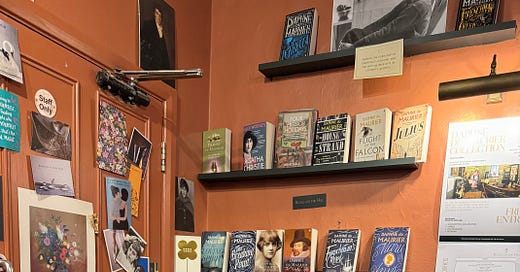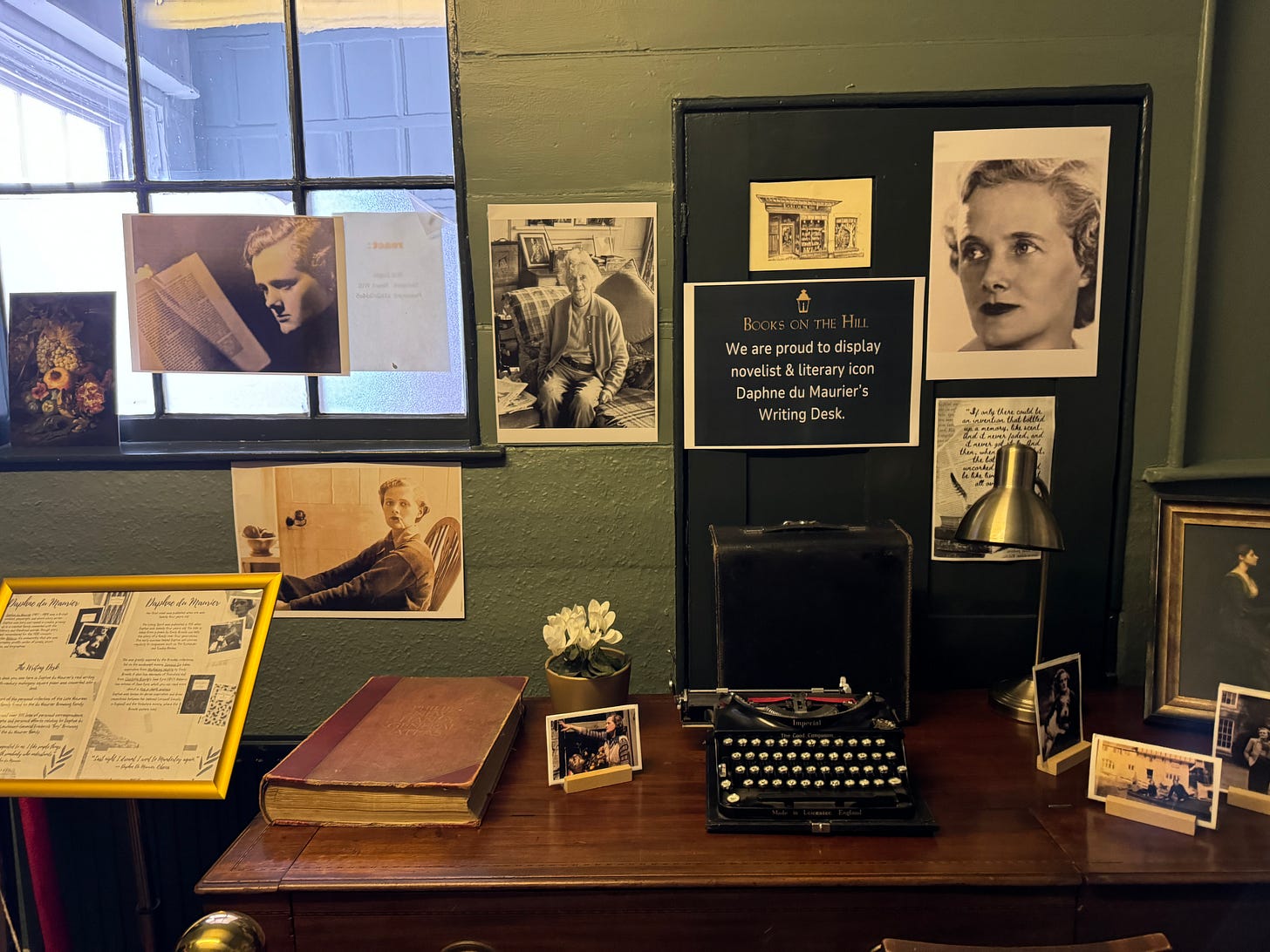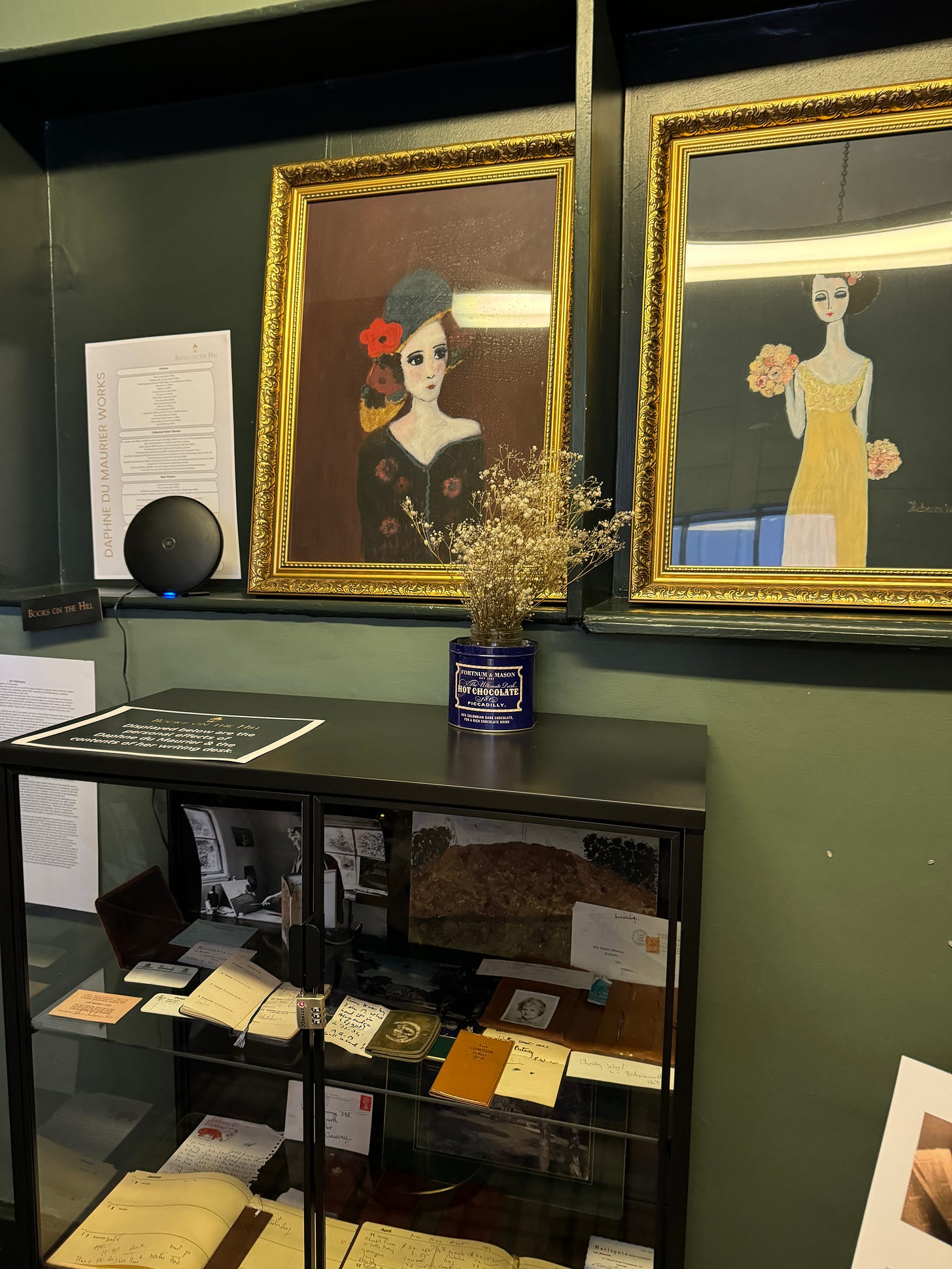Desk du Maurier
Is Daphne du Maurier legit one of my favourite authors? And what is the connection between her and a bookshop in St Albans?
I’ve wanted to write about Daphne du Maurier for a while now, ever since something unexpected happened when I acquired a second-hand copy of her novel My Cousin Rachel while visiting a friend in St Albans.
I read and enjoyed My Cousin Rachel, and have also since read and enjoyed a collection of du Maurier’s short stories entitled Don’t Look Now. This pattern raises the question: how many books by an author do you have to read and enjoy before you start to think, is this author one of my favourites? Is it just the number of books by them you have read (hello Terry Pratchett), or the ratio of hits to misses among what you’ve read by them? If it’s the latter, then Daphne du Maurier has got to be up there as one of my favourite authors. I’ve read five works by her over the years (by no means the most I’ve read from a single author) and they’ve been pretty much all killer, no filler, for me.
Here I’m reviewing the two most recently read ones mentioned above to share a sense of what makes her so great.
My Cousin Rachel
There is an obvious comparison to be made between this book and du Maurier’s more famous novel Rebecca. They are both set in fairly isolated houses in Cornwall; they are both a sort of psychological thriller featuring a protagonist who becomes unsettled by events and the influence of other people (in fact mainly the characters who give the books their titles: indirectly, Rebecca de Winter; and, directly, ‘cousin Rachel’). Without wanting to give too much away, they both come to a thrilling and tragic conclusion.
On the other hand, in some ways they do differ or are mirrors of each other. In Rebecca, the unnamed narrator (simply Mrs de Winter as she is the new wife of widower Maxim de Winter) seems frightened and uncertain from the beginning of her new life in the marital home at Manderley. In My Cousin Rachel, the narrator, Philip Ashley believes he is in more control, although he is in some ways naive and doesn’t know what he doesn’t know. He at least can exert some physical control over Rachel, who is a real, living person, even if she may be manipulating him, or that is at least what other characters with his best interests at heart (his godfather/guardian and friend, Nick Kendall; Louise, his childhood friend and potential marriage partner until Rachel comes long) are at great pains to try to make him understand.
'There are some women, Philip,' [Nick Kendall] observed, 'good women very possibly, who through no fault of their own impel disaster. Whatever they touch, somehow turns to tragedy. I don't know why I say this to you, but I feel I must.'
In contrast, Mrs de Winter is almost haunted by the shadow of the deceased Rebecca de Winter, her husband’s first wife. Rebecca’s ways are still followed in the house, and the new Mrs de Winter struggles to make her mark on the home and its routines. She constantly feels like she is being compared to Rebecca, and even compares herself to her, and is found wanting. Except, this being du Maurier, it’s not about actual ghosts, but about psychology. I think this is where the power in her writing lies. She grips you by asking questions about, or simply presenting the complexity of, human nature and doesn’t let go until the story has played out and you’ve been powerless as a reader to intervene.
Comparing these two excellent novels could be an in-depth essay by itself, but My Cousin Rachel stands up on its own two feet as a great read in its own right.
The central mystery of the book (did Rachel murder her husband, Ambrose, another cousin of Philip whom he has looked up to since early childhood?) is never really resolved, and it drives the tension of the story as Philip seems to become infatuated with Rachel (and vice versa?) in the same way as Ambrose did. There’s an emphasis on how physically alike Ambrose and Philip are, so there is a sense of history repeating itself, and yet Philip has always felt lacking in comparison. It’s this lack of self-esteem that adds depth to the story and the psychological side of it.
Various characters try to point out that Rachel seems to be manipulating Philip (mostly for financial gain), but he is in too deep to turn back, experiencing some kind of sunk cost fallacy whereby he sides with Rachel every time and even changes his behaviour to enable her, for example increasing an allowance he is paying her which feeds a spending habit, even after evidence of extravagant spending is pointed out to him. It seems Philip is in love with Rachel, but is that out of genuine growing mutual affection or because she was the object of Ambrose’s desire (that Philip even questioned at the time, when it happened quickly and at a distance, abroad), the cousin that he so looked up to and wanted to be like? The genius of du Maurier is that you don’t know, and yet she reveals enough of Philip’s inner mind to draw you in as a reader.
It’s no wonder that Alfred Hitchcock mined du Maurier’s work for inspiration for some of his most famous and successful psychological films ('Rebecca’, ‘The Birds’).
Don’t Look Now and Other Stories
This was a great collection of short stories. There are only five in this collection, as they are a bit longer than some short stories, but maybe this is the ideal length for me for a short story. In general, some short stories are a little too short and are more of an impression or extended thought, whereas these had their own narratives and character development. In other words, they felt like complete stories, just short!
It has to be said that some of the language and ideas in these is outdated and could be jarring to a modern audience, which is a shame as, without that caveat, ‘Don’t Look Now’ in particular could be considered an almost perfect short story. It felt like watching an episode of ‘Inside No. 9’ (one of my all-time-favourite tv shows) and I was blown away by the twist/reveal as everything fell into place.
Venice is the setting of ‘Don’t Look Now’, where a married couple are on holiday (or trying to get some rest and recuperation after a personal tragedy, as it turns out) and I love this description of their hotel and the mood of staying away from home:
Their hotel by the Grand Canal had a welcoming, comforting air. The clerk smiled as he handed over their key. The bedroom was familiar, like home, with Laura's things arranged neatly on the dressing-table, but with it the little festive atmosphere of strangeness, of excitement, that only a holiday bedroom brings. This is ours for the moment, but no more. While we are in it we bring it life. When we have gone it no longer exists, it fades into anonymity.
I love Daphne du Maurier’s style in general, with its mixture of the characters’ inner thoughts along with the perfect level of detail in descriptions of physical places, and action, all written with a precision that doesn’t sound boring or clinical.
As with any short story anthology, some stories are stronger than others. The ones that worked best for me are the ones that followed one narrator through the story. In contrast, ‘The Way of the Cross’ changed viewpoints across many characters on a trip to Jerusalem, and I struggled to keep up with the constant switching, along with an unfamiliar setting. Other than that, though, there will be moments and images from all of these stories that I will think of for a long time, I suspect.
Books on the Hill
So what’s the story behind my acquisition of My Cousin Rachel, the event that triggered this recent Daphne du Maurier binge?
When visiting my friend in St Albans during the spring, we popped into the lovely Books on the Hill bookshop and I picked up a second-hand copy of My Cousin Rachel from a shelf near the front of the shop. When I went to the till, the exchange with the assistant went something like this:
Assistant: I see you’ve got a Daphne du Maurier there. Are you a fan?
Me: (thinking about having enjoyed some of her novels, having chosen Rebecca for a piece of English A-Level coursework, having picked this book up because of the author’s name alone) Yes?
Assistant: Well, did you know that we have Daphne du Maurier’s writing desk on display upstairs?
Me: What? Her actual desk?!
Assistant: Yep, her actual one.
Me: brb…
I went upstairs to investigate, and there it was! Complete with a display about her. I’ve since been back to the bookshop to have a better look (seeing as my friend was already outside the shop waiting for me the first time) and take some photos. What an unexpected treat!
I bought Don’t Look Now on the subsequent visit to this shop too. I think I’ll buy a book of Daphne du Maurier’s each time I go until I’ve got a substantial collection. I actually didn’t find out until recently that the Hitchcock film ‘The Birds’ was based on a du Maurier short story, so maybe the next book of hers I seek out will be a collection containing that story.
In other news, here’s a quick overview of my reading stats for October from Storygraph:
I’m only using it to record the date I start reading a book, and the date I finish reading it, so the stats look a bit off. How can I have read five books in a month when it takes about 22 days to finish one? I finished five books in October is the key point. This is partly due to Natalie Haynes being an excellent writer whose novel The Amber Fury I absolutely devoured. More on that soon…
Currently reading:
Demon Copperhead by Barbara Kingsolver
Psyche and Eros by Luna McNamara









